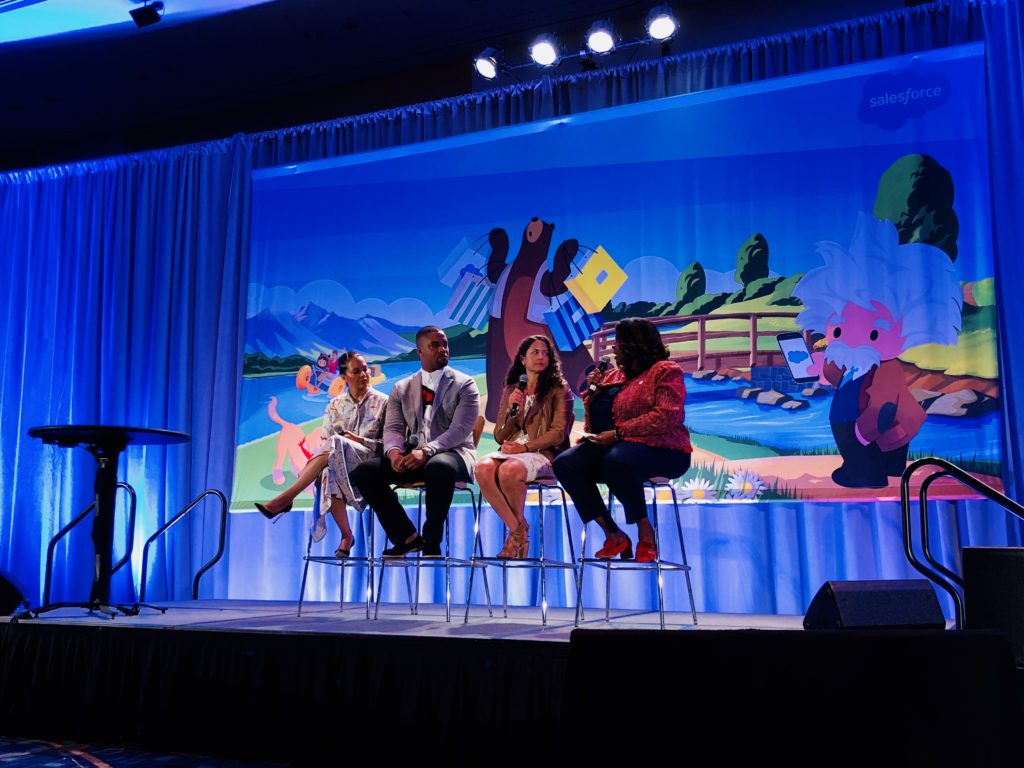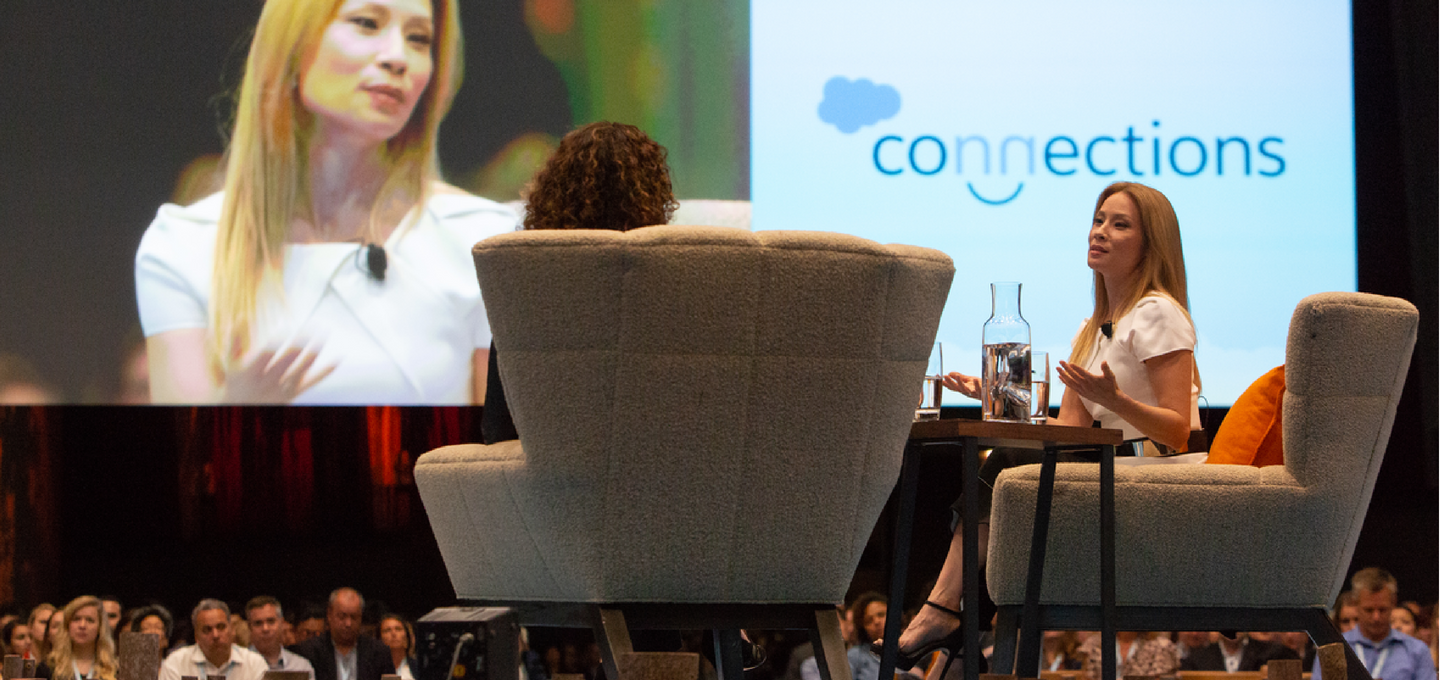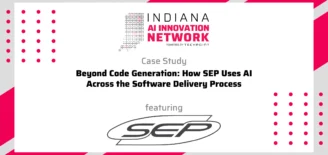Will Salesforce’s ‘change the world’ equality approach influence Indy CEOs?
Sara Croft, TechPoint’s Senior Director of Communications, attended Salesforce’s Connections conference on June 12-14, 2018 in Chicago. This is the third and last post in a series about the Salesforce ecosystem and its impact on Indianapolis. You can read the first story here and the second story here.
What does it mean to have equality as one of your business’ core values?
That’s a question I saw many, many answers to when I attended Salesforce Connections this past June. Over the course of the three-day event, Connections attendees would listen to stories of fighting for equality from Lucy Liu and Kerry Washington in between keynotes about the latest Google Analytics 360 and Einstein integrations. They wore buttons that identified their preferred pronouns while listening to marketing experts explain how to use the new Journey Builder updates.
For Salesforce, equality as a core value is not a PR campaign. After my experience at Connections, I can say with certainty that Salesforce wouldn’t be “Salesforce” without it.
It starts online, where a simple search for “Salesforce and equality” returns several pages of results identifying equality studies, definitions, business practices, and even research studies of the impact equality as a core value can have on a business. For many businesses, their external message of equality is a line item that explains they are an equal opportunity employer, if that.
Those online messages Salesforce projects then trickle down through all aspects of their business, even at events like Connections. Tony Prophet, Salesforce’s Chief Equality Officer, took part in a panel of experts to discuss how to create inclusive marketing campaigns. It was not a demo of a product as you might think, but rather an open conversation about how marketers can open their eyes and find resources they need to develop marketing campaigns that speak to everyone, not just those who created it.

On stage during Bret Taylor’s keynote, an MVP was given — or rather earned — to a woman who created a “Women in Email” group when she realized that she was not interacting and engaging with as many women in email as she had liked. An MVP is reserved for Salesforce Trailblazer Community members who have not only blazed their own trail, but have created trails for others to take.
Salesforce also hosts Dreamforce, a brand-focused event that promotes “four high-energy days of learning, inspiration, equality, and fun,” which will be held in San Francisco this September. While both events are equally infused with Ohana, a word that means “family” and is ubiquitous with the company’s brand, Dreamforce brings together Salesforce’s customers, partners, employees, and key stakeholders while Connections is highly focused on customers and people who use the product every day.
Why does Salesforce spend energy and resources amplifying equality to their customers at an event like Connections?
Here’s what it’s not about. It is not about selling more licenses for their software. Sure, that might be a byproduct, but as I mentioned earlier in this piece, equality is not a PR or thought-leadership campaign for Salesforce.
Equality, for Salesforce, is one of the key ingredients to their ecosystem.
It wasn’t intentional to see a layer of equality dusted over the carpet at Connections. It was already there, and will be there next time. No marketer placed an order for pronoun buttons just for this event. When Lucy Liu was asked to speak, I doubt anyone wavered at asking her to talk about her experiences as a woman in the entertainment industry. It was a no-brainer.
That intentional absence of pointing out “the equality in the room” sets an example for customers and product users for what they expect from their other vendors and products and hopefully, from themselves.
Such a strategy supports Bret Taylor’s statement that “fundamentally, we believe that business is the greatest platform for change in the world.”
Taylor, a chief product officer at Salesforce, speaks from the top. CEO and Chairman Marc Benioff seems out to change the world through his company. As a CEO, if he can break stereotypes and knock out barriers that often seem like they’ll never go away, he can set an example for current and future business owners and workers who will now demand change, especially once they’ve seen it happen elsewhere.

For a company with a projected $10.5 billion in revenue by FY18*, that’s a lot of change.
An intentional focus on equality can create equal pay, attract better talent, create a culture of engaged employees, and increase your bottom line. Those are all topics that you as a reader could naturally draw from this story and would anticipate that I write about.
What I want you to take away from this is how all of those things create a larger change, a social good kind of change, one that makes you think “what if.” Benioff didn’t need his company to be evaluated at $10.5 billion to decide that he had the ability to make meaningful change in his company, in the communities they adopt, and the greater technology ecosystem.
What will it take to create that change in Indianapolis? Will Salesforce set an example for other tech CEO’s to follow? Can we go from laggard to leader in equality? Or will we allow Salesforce to blaze the trail, but choose our own journey?
In a Business Insider article, Benioff is quoted saying “the CEO’s of the future will talk about how companies create more equality.” I hope Indianapolis can say “our CEO’s are well on their way.”
*This was stated during Bret Taylor’s keynote at Salesforce Connections 2018. You can watch the first chapter of the keynote here where the information is referenced at 10:33.



